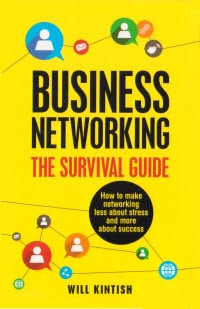Networking made easy: An interview with Will Kintish
This blog is reader-supported. When you purchase something through an affiliate link on this site, I may earn some coffee money. Thanks! Learn more.

Is your summer stretching ahead with one cocktail networking event after another? No? Mine neither. However, there is always some kind of requirement to met new people as a project manager, even if it’s just your next project team. And as author Will Kintish says, networking is simply about building relationships. I asked him for some more tips on getting started confidently.
Will, let’s start at the beginning. How would you define networking?
Networking is something everyone on the planet does every day. It is simply building relationships. Every day we either reinforce existing relationships or we make new ones when we attend business and social events. There are 3 key steps to building long-term meaningful new relationships: know, like and trust.
- Get to know someone when you attend events. Every relationship has to start somewhere often with a smile, a handshake and the swopping of names and initial information.
- You have to build rapport early in any new relationship and get people to like you otherwise the relationship will never get off the ground. Find common ground, ask good questions, listen carefully and be genuinely interested.
- To create long-term meaningful relationships you and I need to build trust. This can be done quickly if after meeting someone new you offer to send them something useful to them you actually do it and do it quickly. Speed stuns. If you agree to call, email or broker an introduction again do it within 24 hours or when both parties agree a time which is suitable for both.
Why is now the right time for project managers to be thinking about networking?
As business activities are beginning to grow again, more opportunities are bound to occur. Project managers should be thinking about their career and business development prospects with an approach which is proactive rather than reactive.
In today’s highly competitive world, being a confident and effective networker sets you apart from the crowd. You become more visible, always feel in control and will always create more business opportunities than the average.
However technically capable one is at one’s job in today’s crowded marketplace, each person is generally a secret — particularly early on in one’s career. When you attend events people get to know who you are and what you do. Conversely, you find out what others do and how you can create mutually-beneficial business relationships. People buy people before they buy your service and when you build rapport easily people will want to do business with you rather than your competition.
So you advocate face-to-face as the best way of networking?
Of all the different ways to communicate, the original face-to-face method has to be, and always will be, the best way to build true relationships. The electronic channels of communication are here to stay but will never replace the smile, the handshake, the eye contact and the genuine interest, asking intelligent and searching questions for starting a true relationship.
Why do you think people don’t like or fear networking? It’s not that hard, is it?
From my experience the vast majority do not like or fear networking and yes, it isn’t that hard. As I said at the start, it is simply building relationships. When I started out as a trainee accountant no-one used the word: it was called talking in those days!
My extensive research tells me people have 3 key fears:
1. Fear of Rejection
“Will anyone talk to me?” “Will I be included?” “Have I got the right to be in this room full of more experienced people?”
I share my experience and suggest when you are welcoming and warm to others the chances of rejection are slight. The tiny percentage of rude ignorant people should be dismissed and left alone.
2. Fear of the Unknown
“They are all strangers; what can I say to them?” “How do I know who to approach?” “What is going to happen at this event?”
I explain that even starting a conversation with a stranger you will find something in common. It is to do with the event itself. ‘Who do you know here?’ ‘What are you hoping to learn from this conference?’ ‘Where have you travelled from?’
Every room has open-formatted and closed-formatted groups. Look for the person alone or groups in open format and approach with a courteous, ‘Please may I join you?’ ‘May I introduce myself?’
3. Fear of failure and embarrassment
Many less-experienced professionals feel that these fears are caused by getting involved in conversations where they believe or realise that the other person knows more about a topic than they do. I simply suggest you use the 3 letter acronym TED to find out more:
Tell me what you mean…
Explain how….
Describe exactly where….
OK, it’s proof time. Do you have an example of where you or a connection have benefited directly from networking. Otherwise it’s just idle chit chat over cheap wine isn’t it?
I have literally hundreds of examples. People looking for their next career move have been on my open courses and mentioned this fact. A fellow delegate has said ‘I’m looking for someone like you’. New positions have been filled.
I attended a charity event where I presented. I met Nigel. We have become firm business associates.
I belong to a breakfast networking club where I use most of my fellow breakfasters for my services. Finding reliable suppliers is as important as gaining new clients.

Networking is a fundamental business skill. If you don’t network, or do it unwillingly or badly, it won’t stop you being successful.
BUT when you are known for being good at what you do, and you are an effective and confident networker, I believe any goal you set yourself will be achieved.
Business Networking – The Survival Guide by Will Kintish (Pearson) is out now, priced £12.99, from Amazon and all good book shops.
